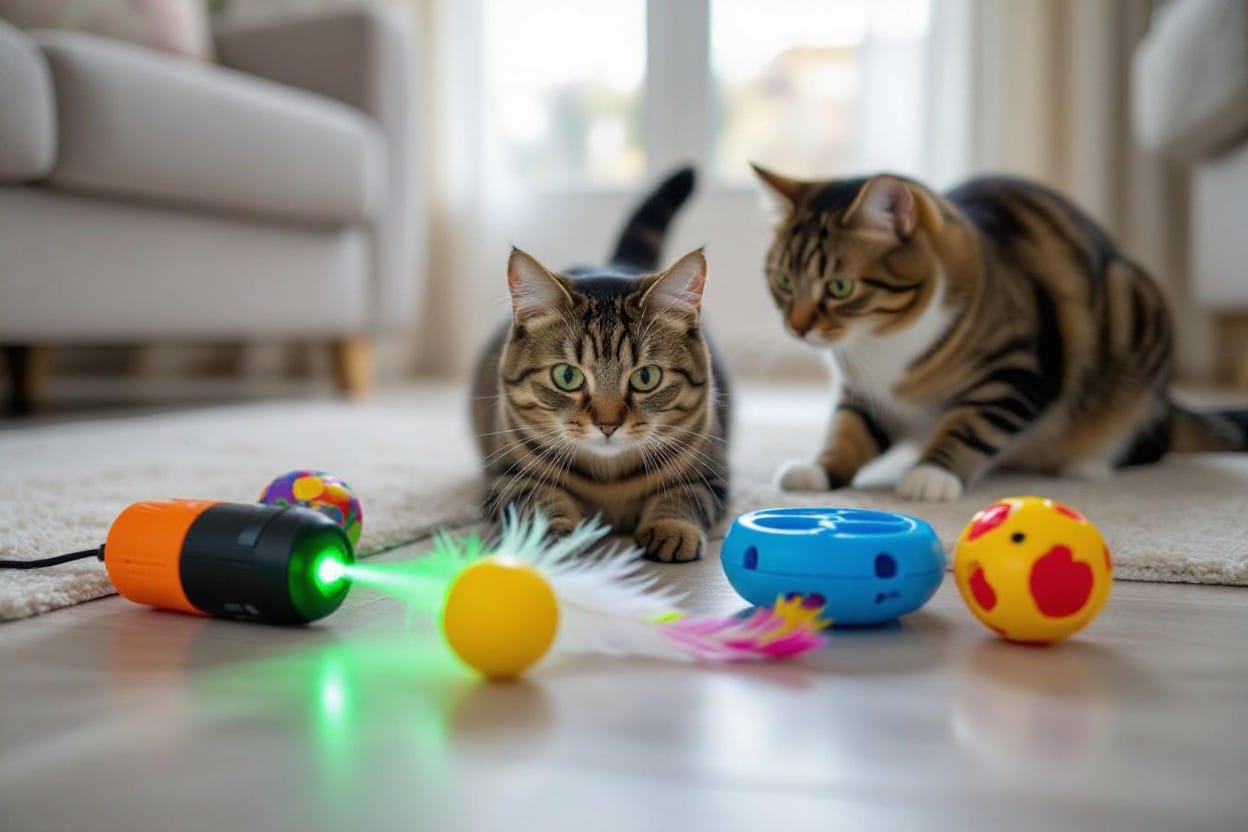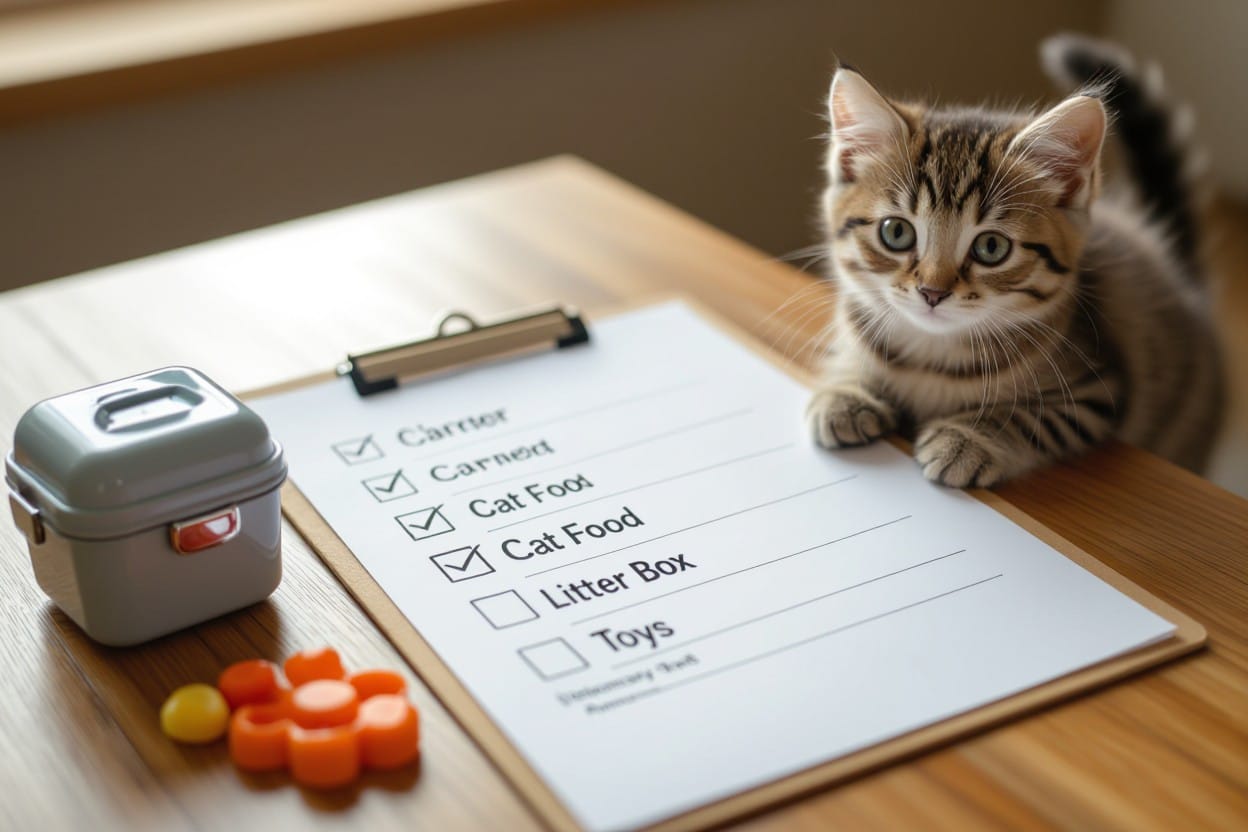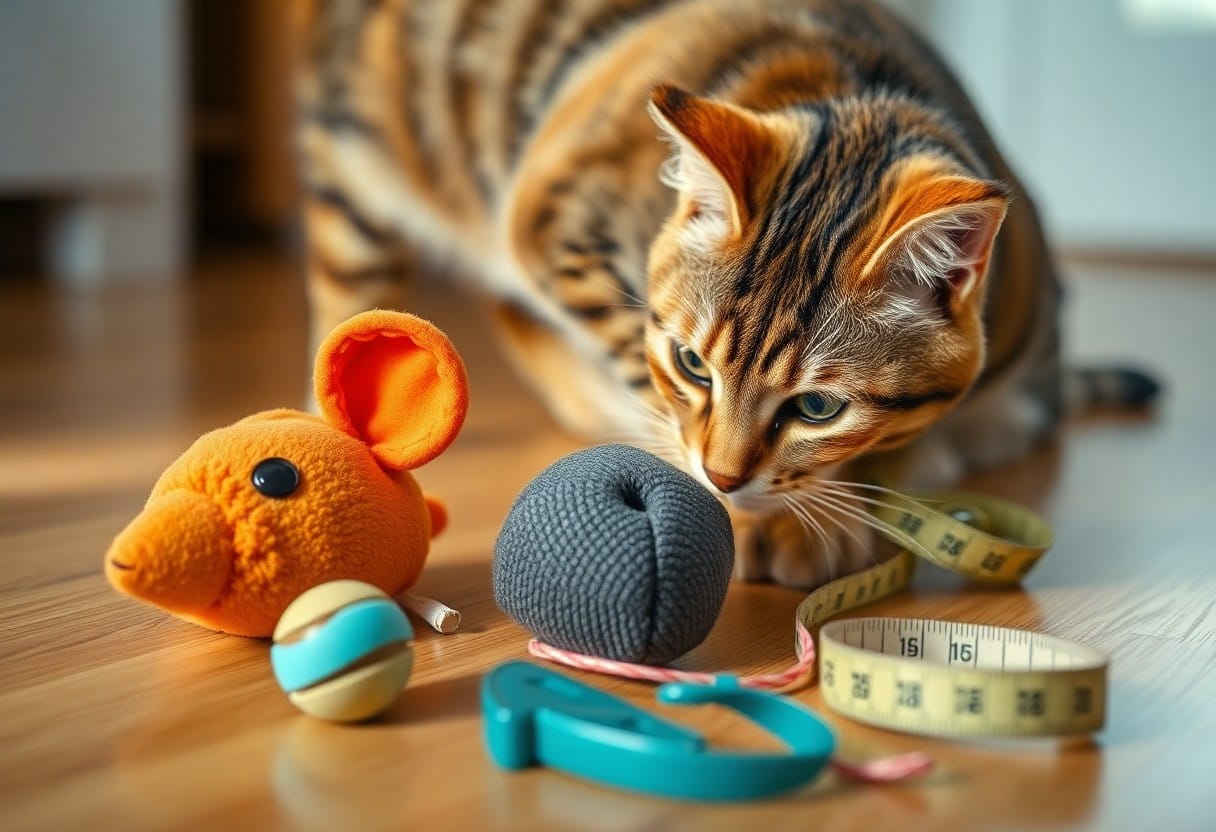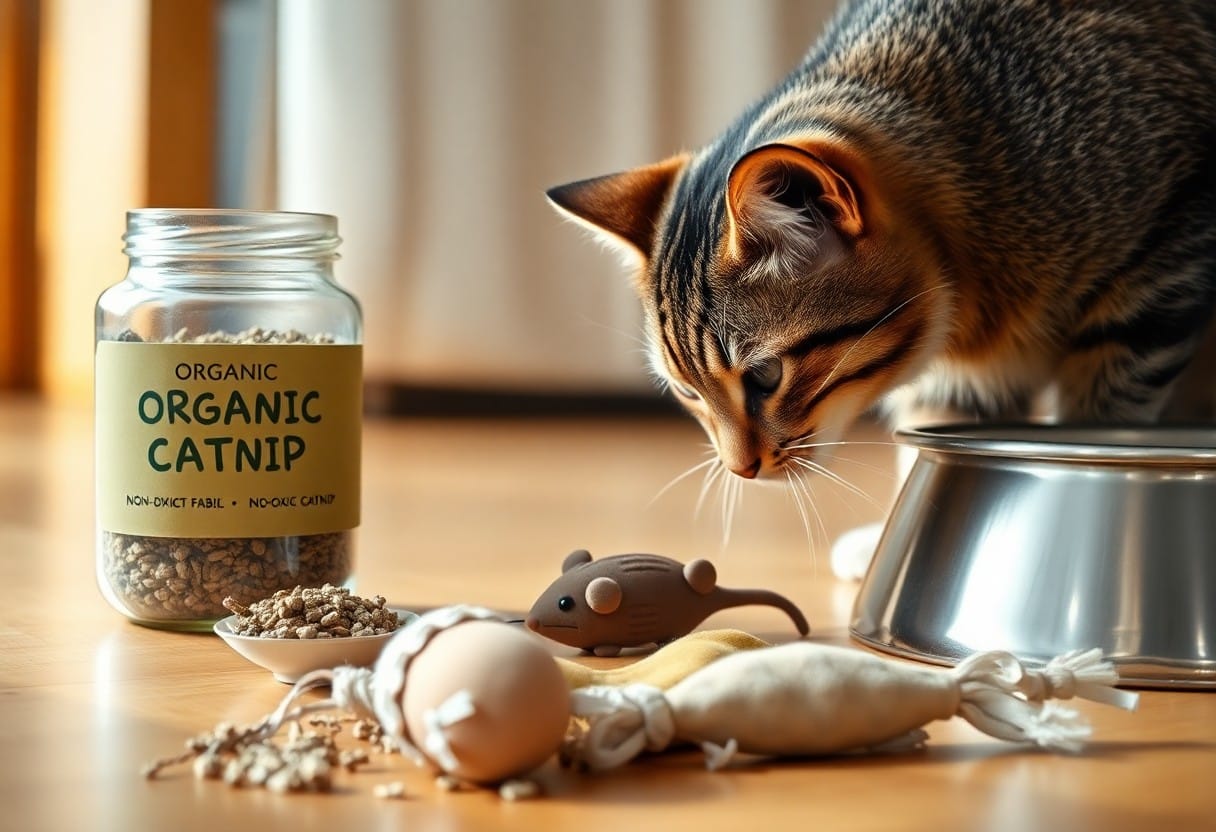Preventive care plays a crucial role in ensuring our feline companions live happy and healthy lives. By being aware of common health issues in cats and taking proactive steps to prevent them, cat owners can help their pets avoid unnecessary suffering and costly treatments. This guide will explore some of the most prevalent health problems in cats and provide practical tips on how to keep your furry friend in the best possible shape.
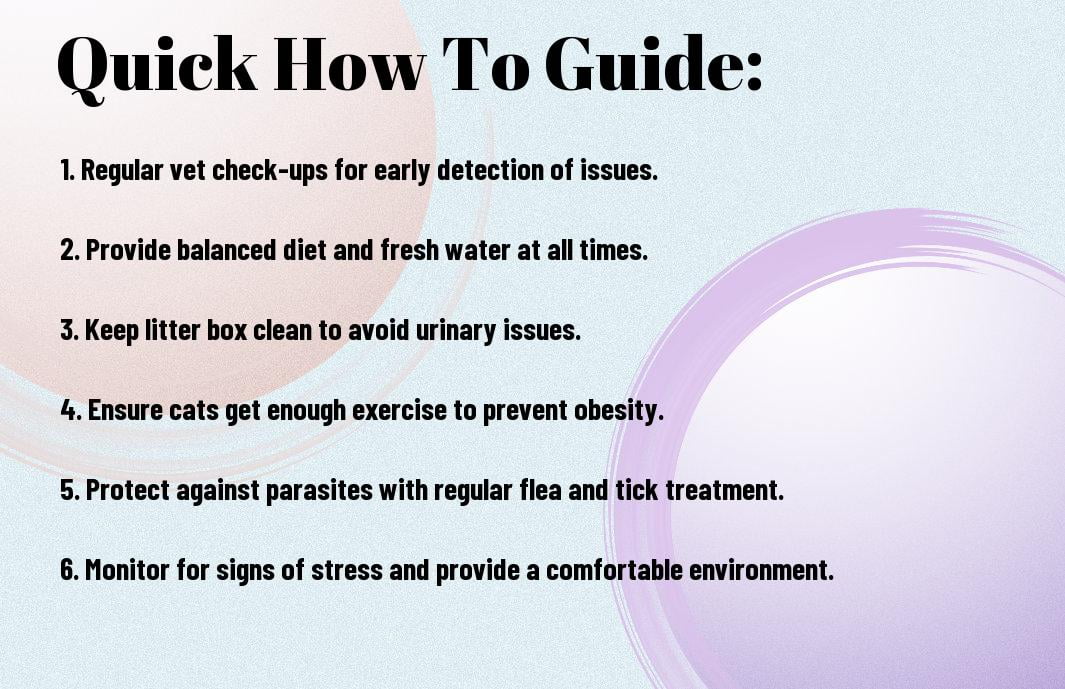
Nutrition and Its Role in Feline Health
Even though cats may seem like independent creatures, their overall health and well-being greatly depend on the quality of their nutrition. A well-balanced diet is crucial for maintaining your cat’s health and preventing common feline health issues.
How to Choose the Right Cat Food
Choose cat food that is specifically formulated for your cat’s life stage, whether they are a kitten, adult, or senior. Look for high-quality protein sources such as meat or fish as the primary ingredient. Avoid foods that contain excessive fillers like corn, wheat, and soy, as these may lead to digestive issues and allergies in some cats.
Tips for Maintaining a Balanced Diet for Your Cat
- Ensure your cat has access to fresh, clean water at all times.
- Monitor your cat’s weight and adjust their food intake accordingly to prevent obesity.
- Consult with your veterinarian to determine the proper portion sizes and feeding schedule for your cat.
Food portions can vary depending on your cat’s age, size, activity level, and overall health. It’s important to follow the feeding guidelines provided on the cat food packaging and adjust as needed based on your cat’s individual needs. Monitoring your cat’s weight and body condition can help you determine if their diet is appropriate.
Nutrition
- Provide a variety of cat food flavors and textures to keep mealtime interesting and provide a range of nutrients.
- Introduce new foods gradually to prevent digestive upset and food aversions.
After making any changes to your cat’s diet, monitor their health and behavior closely. If you notice any unusual symptoms or changes, consult with your veterinarian for guidance on maintaining a balanced diet for your feline friend.
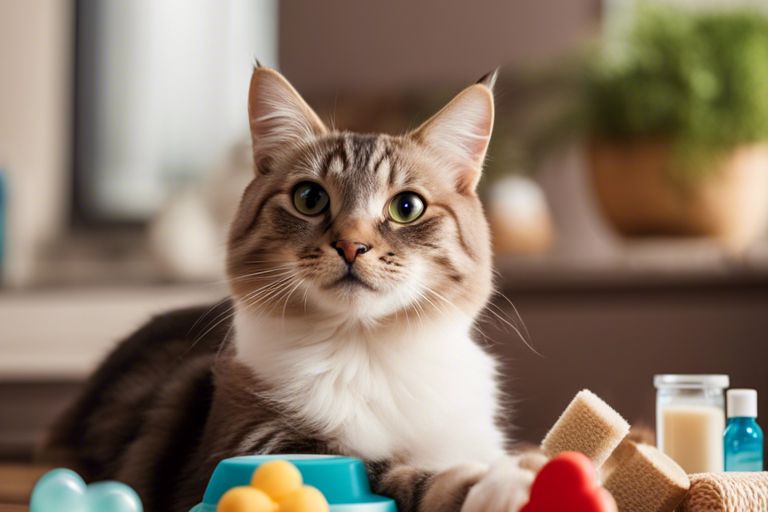
Parasite Prevention and Control
Many cat owners may not realize the importance of parasite prevention and control in maintaining their feline friend’s health. Parasites such as fleas, ticks, and worms can cause various health issues and discomfort for cats. It is crucial to take proactive measures to protect your cat from these parasites.
How to Protect Your Cat from Fleas and Ticks
The key to protecting your cat from fleas and ticks is through regular preventative treatments. Consult with your veterinarian to choose the most suitable products for your cat. Topical spot-on treatments, oral medications, and collars are common options for flea and tick prevention. Additionally, it’s important to keep your cat’s living environment clean by regularly vacuuming and washing their bedding to reduce the risk of infestations.
Preventing Worm Infestations in Cats
While fleas and ticks pose external threats, worms are internal parasites that can affect your cat’s health. Preventing worm infestations in cats involves routine deworming treatments as recommended by your veterinarian. Kittens should be dewormed starting at a young age, and adult cats should follow a regular deworming schedule based on their lifestyle and risk factors. It’s also important to practice good hygiene and dispose of your cat’s feces properly to prevent the spread of worm eggs in the environment.
Control
Regular veterinary check-ups are crucial for monitoring your cat’s overall health and detecting any signs of parasite infestations early. By staying proactive and following your veterinarian’s recommendations for parasite prevention and control, you can help ensure that your cat stays healthy and parasite-free.
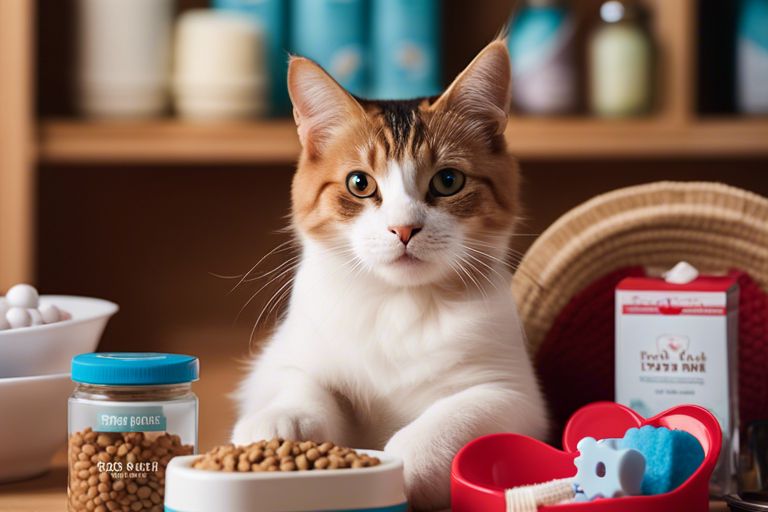
Dental Health in Cats
Keep your feline friend’s oral health in check by paying close attention to their dental care. Dental issues are common in cats and can lead to serious health problems if left untreated. It’s important to establish a regular dental routine to prevent dental problems and maintain your cat’s overall well-being.
How to Establish an Effective Dental Routine
Assuming your cat is comfortable with you handling their mouth, start by gently brushing their teeth with a cat-specific toothbrush and toothpaste. Gradually introduce this routine to your cat to make it a stress-free experience. Additionally, providing dental treats or toys can help reduce plaque and tartar buildup.
Professional Dental Cleanings: Factors to Consider
To ensure your cat’s dental health is in top shape, consider professional dental cleanings. Factors to consider include the cat’s age, overall health, and any existing dental issues. Anesthesia is often necessary for a thorough cleaning, which can be concerning for cat owners.
- Assume that your veterinarian will perform a detailed examination before recommending a professional dental cleaning.
Vaccination and Preventing Infectious Diseases
Understanding Core and Non-Core Vaccines for Cats
For optimal health, it is crucial to understand the difference between core and non-core vaccines for cats. Core vaccines are those that every cat should receive to prevent severe, life-threatening diseases that are easily transmissible to other cats or even humans. These vaccines protect against common illnesses such as rabies, feline viral rhinotracheitis, calicivirus, and panleukopenia. On the other hand, non-core vaccines are recommended based on the cat’s lifestyle, environment, and risk of exposure to specific diseases such as feline leukemia virus (FeLV) and feline immunodeficiency virus (FIV).
Preventing Common Infectious Diseases
Your veterinarian will recommend a tailored vaccination schedule for your cat based on their individual needs and potential exposure to various infectious diseases. By following this schedule, you can effectively prevent serious health issues and ensure your cat’s overall well-being. Remember that prevention is always better than cure when it comes to infectious diseases, so staying up to date with vaccinations is key in safeguarding your feline friend from harmful illnesses.
Infectious diseases in cats can spread rapidly, especially in multi-cat households or environments where cats interact closely with other animals. By ensuring that your cat receives core vaccinations and discussing non-core vaccines with your veterinarian, you can significantly reduce the risk of infectious diseases and help your cat lead a long and healthy life.
Behavioral Issues and Environmental Enrichment
Despite their reputation for independence, cats can suffer from a variety of behavioral issues that may stem from stress, boredom, or lack of environmental enrichment. Recognizing and addressing these problems is crucial for maintaining your cat’s overall health and well-being.
How to Address Common Behavioral Problems in Cats
You can address common behavioral problems in cats by first identifying the root cause. Regular veterinary check-ups can help rule out any underlying medical issues. Additionally, providing a stimulating environment, engaging in interactive playtime, and creating a consistent routine can help alleviate stress and boredom in your feline companion.
Increasing Environmental Stimulation for Indoor Cats
Tips for increasing environmental stimulation for indoor cats include setting up scratching posts, cat trees, puzzle feeders, and interactive toys to keep your cat mentally and physically engaged. Creating vertical spaces for climbing and hiding spots can also satisfy your cat’s natural instincts to explore and perch.
Common environmental enrichments like window perches, bird feeders outside windows, and rotating toys can prevent boredom and provide mental stimulation for indoor cats. Introducing new scents, sounds, and textures can also keep your cat curious and entertained, reducing the likelihood of developing behavioral issues.
Regular Health Check-Ups and Age-Related Care
How to Conduct Home Health Assessments on Your Cat
To ensure your cat’s well-being, it’s crucial to conduct regular home health assessments. Start by observing your cat’s behavior, appetite, water intake, litter box habits, and overall appearance. Have a checklist handy and note any changes or abnormalities.
Tips for Senior Cat Care
As your cat ages, their needs evolve. Providing proper care can enhance their quality of life and longevity. Regular veterinary check-ups become even more crucial as cats get older. The vet can catch age-related issues early on and recommend appropriate treatments.
- Ensure a balanced diet suitable for senior cats.
- Make accommodations for mobility issues, such as providing ramps or steps.
- Consider investing in a comfortable and supportive bed for your senior cat.
Care for your senior cat may require additional attention and patience. As they age, they may need assistance with grooming, maintaining a healthy weight, and managing any chronic conditions. The bond between you and your senior cat can grow stronger with attentive care and understanding of their changing needs.
- Regular interaction and playtime are vital for your senior cat’s mental and physical well-being.
Conduct
Summing up
Conclusively, being aware of common health issues in cats and taking preventative measures can help ensure a longer and healthier life for your feline friend. Regular veterinary check-ups, a balanced diet, adequate exercise, and a clean environment are key factors in maintaining your cat’s well-being. By being proactive in identifying and addressing potential health concerns, you can help prevent these issues from developing and provide the best possible care for your beloved pet.
FAQ
Q: What are some common health issues in cats?
A: Common health issues in cats include dental problems, obesity, diabetes, urinary tract infections, and upper respiratory tract infections.
Q: How can I prevent dental problems in cats?
A: You can prevent dental problems in cats by regularly brushing their teeth, providing dental treats or toys, and scheduling annual dental cleanings with your veterinarian.
Q: What can I do to prevent obesity in my cat?
A: To prevent obesity in your cat, feed a balanced diet, monitor portion sizes, encourage exercise through play, and avoid feeding excessive treats.
Q: What are the signs of diabetes in cats?
A: Signs of diabetes in cats include increased thirst and urination, weight loss, lethargy, and unkempt fur. If you notice these signs, consult your veterinarian for proper diagnosis and treatment.
Q: How can I prevent urinary tract infections in cats?
A: To prevent urinary tract infections in cats, provide fresh water daily, feed a balanced diet, keep the litter box clean, and monitor your cat’s litter box habits for any changes that may indicate a potential issue.





